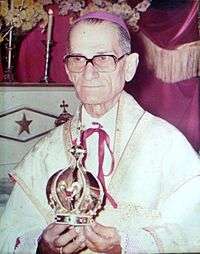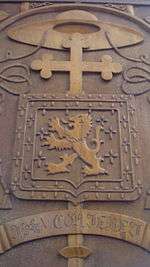Antônio de Castro Mayer

| Ordination history of Antônio de Castro Mayer | |
|---|---|
Priestly ordination | |
| Date of ordination | 30 October 1927 |
Episcopal consecration | |
| Principal consecrator | Carlo Cardinal Chiarlo |
| Date of consecration | May 23, 1948 |
| excommunicated (as declared next day) | 30 June 1988 |
| Bernard Tissier de Mallerais | June 30, 1988 |
| Richard Williamson | June 30, 1988 |
| Alfonso de Galarreta | June 30, 1988 |
| Bernard Fellay | June 30, 1988 |
Antônio de Castro Mayer, STL (20 June 1904—25 April 1991) was a Brazilian prelate of the Roman Catholic Church. A Traditionalist Catholic and ally of Archbishop Marcel Lefebvre, he was Bishop of Campos from 1949 until his resignation in 1981.[1]
In 1988, he incurred the automatic canonical penalty of excommunication for participating in the illicit consecration of four bishops of the Society of St. Pius X (SSPX). This penalty also applied to Archbishop Lefebvre and the four bishops that they ordained. However a subsequent public declaration of the penalty by the Holy See omitted his name, identifying only Archbishop Lefebvre and the four bishops whom they ordained. In 2009, Pope Benedict XVI lifted the canonical penalty incurred by the four surviving bishops in the hope of facilitating full reconciliation of the SSPX.[2]
Biography
Antônio de Castro Mayer was born in Campinas, São Paulo, to Joao Mayer, a Bavarian stonemason, and his wife, Francisca de Castro, a Brazilian peasant. One of twelve children, Antônio helped his mother support their family after Joao died in 1910. At age 12, he entered São Paulo's minor seminary, then run by the Premonstratensian Fathers. After entering the major seminary in 1922, he was sent to study at the Pontifical Gregorian University (from where he obtained his doctorate in theology in 1928) in Rome. Mayer was ordained to the priesthood by Basilio Cardinal Pompilj on 30 October 1927, and then taught philosophy, history of philosophy, and dogmatic theology at the seminary in São Paulo.
Before being named Vicar General of São Paulo in 1942, he became Assistant General of the city's Catholic Action in 1940 and a canon of the cathedral chapter (with the title of First Treasurer) in 1941. He was made a parish priest and the prefect of studies at the Pontifical Catholic University of São Paulo in 1945.

On 6 March 1948, Mayer was appointed Coadjutor Bishop of Campos and Titular Bishop of Priene by Pope Pius XII. He received his episcopal consecration on the following 23 May from Archbishop Carlo Chiarlo, with Bishop Ernesto de Paula and Archbishop Geraldo de Proença Sigaud, S.V.D., serving as co-consecrators. He succeeded Octaviano de Albuquerque as Bishop of Campos on January 3, 1949, and was very active in combating liberation theology and communist infiltration of the Church and of his diocese.
De Castro Mayer, a staunch traditionalist, refused to implement the reforms of the Second Vatican Council in his diocese. Until his resignation on 29 August 1981, the Tridentine Mass continued throughout the Campos diocese, along with all the other traditional Catholic practices and devotions. He continued this even after resigning as diocesan ordinary and being succeeded by Bishop Carlos Navarro. He was able to maintain a completely traditionalist "diocese" within a diocese, with around 40,000 faithful, which he organized in parallel chapels. (The diocese itself, without the followers of Bishop Castro Mayer, had some 850,000 Catholics.) This organisation was called the Priestly Society of Saint John Mary Vianney. Under the leadership of his successor, Bishop Licínio Rangel, this organization was subsequently reconciled to the Catholic Church and reconstituted as the present Personal Apostolic Administration of Saint John Mary Vianney, with the same territory as the Diocese of Campos, Brazil, by Pope John Paul II in January 2002.
In 1968, the Catholic conservative group Tradition, Family, and Property organized a campaign to collect signatures denouncing what were perceived as leftists in the Church. De Castro Mayer lent encouragement to the campaign. Later the National Conference of Bishops of Brazil declared that TFP was neither recognized by the hierarchy nor considered an official Catholic organization.[3]
On his death bed, Bishop de Castro Mayer refused to sign a so-called "formula of reconciliation" (which would include an admission that excommunication was really incurred and that no situation of necessity, as claimed by Lefebvre and Castro Mayer, had existed in 1988) proposed by Vatican delegates at his death bed. He died of respiratory failure in Campos on 25 April 1991.
Notes
- ↑ "Bishop Antônio de Castro Mayer". Catholic-Hierarchy.org. David M. Cheney. Retrieved 21 January 2015.
- ↑ Pope lifts excommunications of Lefebvrite bishops
- ↑ Klaiber, Jeffrey. The Church, Dictatorships, and Democracy in Latin America, Wipf and Stock Publishers, 2009 ISBN 9781606089477